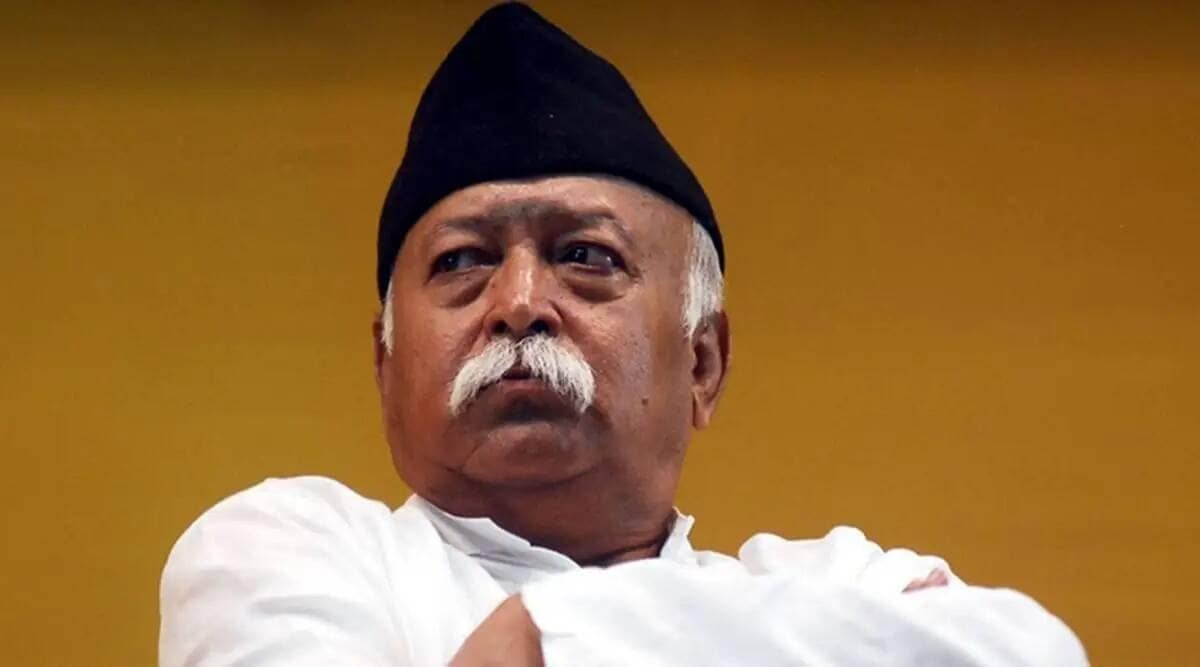 The delegation did not bother to confront the RSS chief on issues such as mounting unemployment, hunger and violence against women.
The delegation did not bother to confront the RSS chief on issues such as mounting unemployment, hunger and violence against women.A delegation of five Muslim intellectuals, former chief election commissioner S Y Quraishi, former Delhi Lt Governor Najeeb Jung, former AMU vice-chancellor Lt Gen (retd) Zameer Uddin Shah, politician-cum-journalist Shahid Siddiqui (presently with the RLD), and businessman Saeed Shervani (who is with the Samajwadi Party) met the RSS supremo, Mohan Bhagwat at the RSS office in Delhi recently (IE, September 22, 2022). The meeting was kept secret for reasons best known to the participants.
In a post-meeting justification of the parleys, Quraishi wrote (IE, September 26) that their main concern was “the insecurity being increasingly felt by the Muslim community in the wake of recurring incidents of lynching of innocents, calls by Hindutva hotheads for genocide and the marginalisation of the community in almost every sphere”. With two ex-MPs and two former senior bureaucrats as its members, the delegation was expected to be familiar with the protocols of democratic polity — the above-mentioned issues fall in the realm of governance. They should have met the PM or the home minister to demand corrective measures. The next recourse would have been to approach the President. However, they decided to approach the RSS top brass.
These intellectuals might rightly argue that since the RSS controls the BJP, why not approach the source of power itself? But the model they opted for puts a difficult choice before the minorities. This logic could arguably lead to the proposition that Hindus, Sikhs and anti-Islamist Muslims in Kashmir should approach organisations like Hizbul Mujahideen and Jaish-e-Mohammed for securing the safety of their life and property.
Another troubling issue is: How did these intellectuals come to the conclusion that RSS represents all Hindus of India. Have they lost faith in the common Hindus who remain steadfast to India’s democratic-secular polity?
The members of the delegation should have, at least, done some homework on cow slaughter. The most important ideologue of the RSS, MS Golwalkar claimed in 1966 (in the RSS publication Spotlight) that cow slaughter began with the arrival of Muslims who wanted to “stamp out every vestige of self-respect in Hindus”. This is not corroborated even by Swami Vivekananda who stated (February 2, 1900): “You will be astonished if I tell you that, according to old ceremonials, he is not a good Hindu who does not eat beef”. The myth of cow slaughter as a Muslim crime is the creation of the RSS’s hate propaganda. A large number of Dalits and Christians consume beef as well. BJP-run governments in Goa, Karnataka and all Northeastern states allow cow slaughter. Then why punish Muslims alone?
RSS organisations have been at the forefront of spreading the bogey that Muslims, in a few decades, would outnumber Hindus in India. The Muslim intellectuals should have shared with Mohan Bhagwat that despite 1,000 years of Muslim rule (as claimed by RSS) the first Census in India held in 1871-72 recorded: “140½ million of Hindus and Sikhs, or 73½ per cent, 40¾ million of Muslims, or 21½ per cent.” Muslims constitute only 14 per cent of India’s population. In the US, Australia, Canada, New Zealand and UK, the population of Hindus has increased in the last one decade or so. Should it be a matter of alarm for Christians of these countries? Only racists are incensed at such demographic developments.
Quraishi informs us that Mohan Bhagwat emphasised three things: “Hindutva is an inclusive concept in which all communities have equal room… the Indian Constitution is sacrosanct, and the entire country has to abide by it. He sought to dispel the fear that RSS is seeking to abandon the Constitution at the first opportunity. And, that Muslims will be disenfranchised.” If the members of the delegation were familiar with Savarkar’s Hindutva (1923) and Golwalkar’s We or Our Nationhood Defined (1939) and Bunch of Thoughts (1966), these claims would not have gone unchallenged. The first two holy books for the RSS demand the cleansing of Muslims (and Christians) — similar to the fate of the Jews in Germany under Hitler. The last one has a chapter (XVI), “Internal Threats” that declares Muslims and Christians as enemy number one and two and describes the Indian Constitution as worthless and anti-Hindu.
Interestingly, the RSS has not issued any statement corroborating the delegation’s version. According to media reports, RSS prachar pramukh, Sunil Ambekar, declined to comment.
The delegation did not bother to confront the RSS chief on issues such as mounting unemployment, hunger and violence against women. Their social, financial and political marginalisation makes Muslims the worst sufferers of these problems. The delegation also did not touch on the wide use of terror laws by BJP-run governments that has led to the imprisonment of a large number of civil rights activists. These intellectuals should understand that the safety of India’s Muslims hinges on the survival of the country’s secular democratic polity. India needs intellectuals who dedicate themselves to this task and do not restrict themselves to demanding security for a minuscule section of one community from an extra-constitutional power centre.
The writer taught political science at the University of Delhi